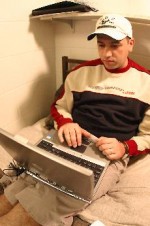Iraqis adjust to USA, USF

On his first day in the United States, Talat Al Mukhtar asked the clerk in his hotel how to get to USF. She replied that it was only ten minutes away. Al Mukhtar, accustomed to life in Baghdad, decided to walk. It was August.
“It was really hot,” he said, “I was dressed up. I was drenched in sweat. I was really ticked off, and I was searching for a cab.”
Of course, there was no cab to be found.
Al Mukhtar’s adjustment to the United States, however, has gone much smoother than this initial welcoming.
Al Mukthar, along with a USF student majoring in political science and a communications engineer, are three of the 2 1/2 million Iraqis who have left their native country since the start of the war in Iraq almost five years ago.
They had to leave their families, their friends and their entire way of life. They had to travel halfway around the world and learn a new culture with its own language and customs.
Three Iraqis out of the handful present at USF as students and professors been here for a few years, others a few months, but they all have something in common: They want to learn something they can take home to their countrymen as to move Iraq out of chaos and into a stable, democratic future.
Omar, 27, graduate student in communications engineering
Omar, who did not want his last name used in this story, is a graduate student from Mosul. He arrived at USF only three months ago and is a first-semester graduate student in communications engineering.
The University of Mosul, where Omar studied, is one of the largest educational centers in the Middle East. He says that it is roughly the same size as USF but the similarities end there; in Iraqi universities there is no picking and choosing classes and professors. In Iraq students arrive at the same time everyday to sit in the same seats, with the same students and professor. Instead of semesters, Iraqi schools work on a yearlong basis with midterms in the winter.
After graduating in 2005, Omar wanted to pursue his education further and began to consider the possibility of traveling abroad for a graduate degree.
“To be honest with you, (the) United States, I never thought of it. In Iraq I thought that this would be the hardest thing. I spent about six months communicating with everywhere except the U.S.A,” he said. “I tried with U.K., I tried with Germany and I tried with Australia… I didn’t receive positive feedback.”
He said he did not give up and decided to search the Web for universities offering his major. USF was the first on the list.
“I made a phone call right away to the computer engineering department here.” They helped him get all of his paperwork in order and ready for his arrival.
Omar plans on returning to Iraq as soon as he is finished with school. He has asked the Oracle not to use his last name because only a few close family members know that he is in the U.S. If that information were to get out it would be dangerous to his family.
Talat Al Mukhtar, 29, graduate student in public health
Talat Al Mukhtar is a doctor from Baghdad pursuing a graduate degree in public health. He has been working in a Baghdadi hospital since graduating medical school in 2001. He left Baghdad in August, leaving behind his wife and 2-year-old daughter, to whom he will return once he finishes school. He came here on a Fulbright scholarship, which gave him the choice of either USF or George Washington University in Washington, D.C. He said he chose USF because the public health program here is a better fit for his interests. “I am away from my family, away from my kid, I don’t have a real job, I am a full time student here and I am dedicated for studying,” he said.
“For an Iraqi to get in the United States, it’s a very hard thing, it’s not like for a German student – it’s totally different. I have to be interviewed by the American Embassy in Baghdad.”
The interview took place in the Green Zone, he explained, describing security measures. He was escorted and had to go through security clearance before being allowed to apply for a visa.
It took Al Mukhtar 35 days to obtain the visa.
Rafraf Barrak, 26, graduate student in political science and Arabic instructor
Rafraf Barrak arrived at USF in 2004 on a scholarship from NBC after working as translator for USF alumnus Kerry Sanders.
She has been pursuing a master’s degree in political science and recently began teaching Arabic. She said one of the hardest things about moving to the United States was getting used to the way people live here – the freedom of speech, the concept of not living with family, and going to a large university. She plans to graduate next May and continue working in the United States.
“For me to imagine going back, that is something that is up to the situation in Iraq. I don’t want to go back and everything that I have worked on from three years ago until now goes away,” she said.
Barrak said nobody in Iraq would appreciate her degree or her work in the United States. If she went back, it would be for her family, but the members were scattered for security reasons and she would not be able to see them.
“I can’t say that I’d just go back and it’s the old home again,” she said. “It’s not.”
Alec Shurtz can be reached at (813) 974-6299 or oracleshurtz@gmail.com.







